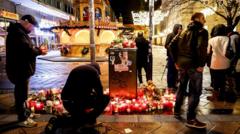Following recent Israeli airstrikes on Beirut's Mar Elias neighborhood, the city, which had briefly experienced a respite from violence, is grappling with renewed fear and the relocation of many families. Residents, once hopeful for safety, now find themselves contemplating their uncertain future amidst escalating conflict.
Israeli Strikes in Beirut Heighten Fear and Displacement Among Residents

Israeli Strikes in Beirut Heighten Fear and Displacement Among Residents
Israeli airstrikes have reignited fears in Beirut, leading to renewed displacement and a sense of insecurity among its residents.
The streets of Beirut were unusually quiet on Monday morning as residents continued to process the wake of the Israeli airstrikes that hit two neighborhoods the previous day. Families who had returned to the capital after fleeing to safer areas in the north are once again packing their belongings and looking for refuge.
After weeks of relative calm, the bombing on Sunday shattered the fragile sense of security that had begun to envelop the city. Many schools, which had been hastily closed during the conflict's initial escalation, have shut their doors once more. The bombings not only claimed six lives but also left dozens more injured, with the Lebanese Ministry of Health reporting the casualties.
Hussein Zahwi, a 49-year-old resident, reflected the sentiments of despair among his neighbors as he surveyed the destruction. He had recently rented an apartment in Mar Elias for the safety of his family, as airstrikes had prompted him to leave his home in the southern suburb of Dahiya. With his children shaken but unharmed, Zahwi is now left contemplating a future filled with uncertainty and fear, questioning the viability of any place to call safe in the current war climate.
The strikes have left behind a trail of destruction, with billowing smoke and remnants of damaged buildings serving as a poignant reminder of the conflict’s relentless grip on the region. For Zahwi and many others, the fear of returning home looms over their choices, underscoring the emotional toll that the ongoing violence has inflicted on the families caught in the war's crossfire.
After weeks of relative calm, the bombing on Sunday shattered the fragile sense of security that had begun to envelop the city. Many schools, which had been hastily closed during the conflict's initial escalation, have shut their doors once more. The bombings not only claimed six lives but also left dozens more injured, with the Lebanese Ministry of Health reporting the casualties.
Hussein Zahwi, a 49-year-old resident, reflected the sentiments of despair among his neighbors as he surveyed the destruction. He had recently rented an apartment in Mar Elias for the safety of his family, as airstrikes had prompted him to leave his home in the southern suburb of Dahiya. With his children shaken but unharmed, Zahwi is now left contemplating a future filled with uncertainty and fear, questioning the viability of any place to call safe in the current war climate.
The strikes have left behind a trail of destruction, with billowing smoke and remnants of damaged buildings serving as a poignant reminder of the conflict’s relentless grip on the region. For Zahwi and many others, the fear of returning home looms over their choices, underscoring the emotional toll that the ongoing violence has inflicted on the families caught in the war's crossfire.



















